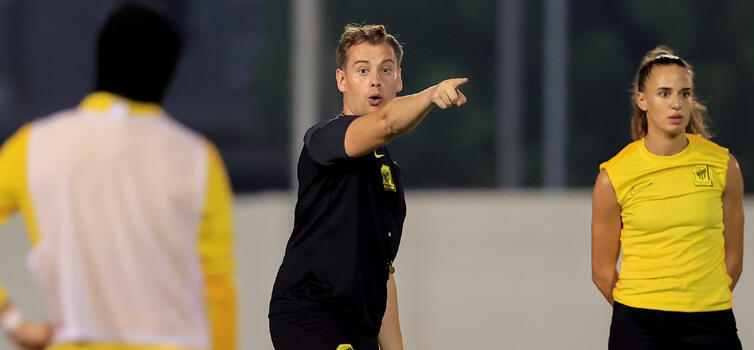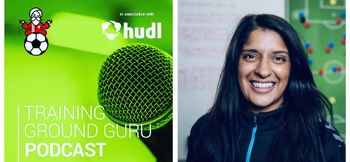'I question why I would go back' - moving from England to Saudi Arabia

Myles Smith is Assistant Manager of Al Ittihad Women in Saudi Arabia
Written by Simon Austin — March 12, 2024
MOVING to Saudi Arabia has been a culture shock for Myles Smith, though perhaps not in the way you’d expect.
The 30-year-old moved to Jeddah last July, to become Assistant Manager of Al Ittihad Women. Prior to that, he had worked in England, for West Ham and then Manchester United Women.
“At West Ham I was Assistant Manager and also the Academy Director of the Women’s,” he tells TGG. “I’d go into work at 6am and leave the Academy training session at 11pm at night.
“You can’t have a personal life, it’s just impossible. I hate it when people say, ‘that’s football’, because it shouldn’t be like that. And if it is, then football isn’t a great place to be. You’re living in London and getting paid 30 to 40 grand a year if you’re lucky.
“That’s at the higher end in women’s first-team football. I think Academy coaches (on the men’s side) are getting paid similar to that. You haven’t got chance to catch your breath. I was in those roles at West Ham for four years and was absolutely exhausted, I couldn’t do it any longer.
"Your whole wage is going on your rent, you’re lucky if you get one weekend out. You’re living pay cheque to pay cheque, you can’t get on the property ladder. I loved the job, loved the people I worked with, but was burnt out and drained."
Joining Manchester United as Women’s and Girls’ Scout was, in many ways, a dream, because he was a lifelong fan of the club and a season-ticket holder, but after nine months he’d “got in bad shape because I was out on the road all the time.”

A 2021 survey found that 59.2% of Academy coaches were paid less than £25,000 per year, with 14.3% being paid less than £15,000.
Almost a third (32.6%) said they were working more than 51 hours per week and 33.7% said they were working between 41 and 50 hours.
That was when the call came from a recruiter - would he fancy a move to the Middle East?
“I never would have thought I’d work in Saudi Arabia, so it took me by surprise more than anybody,” he admits, “but now I question why I’d go back.”
First of all, there’s the lifestyle. The club sorted him out with a nice apartment (where he’s speaking to me from), which is 20 minutes from the training ground and has access to a gym and swimming pool, plus a car and driving licence.
“I’m being looked after from a financial perspective, the people are much friendlier, the environment is a nicer place to work,” he says. “The hours are still long, but they’re not what I was doing and you’re getting rewarded for it, rather than scraping the barrel every month.
“Everyone is so welcoming. It’s a slow pace, which I struggled with at first, but there’s no aggression, no anger; everyone is relaxed.”
His only misstep was going for a run when he first arrived. “It was July and 42 degrees. The pavements were empty and cars were bipping to check I was ok as they drove past.”
As well as the lifestyle, he's enjoying the football too. The crowds for their games tend to vary between 200 and 500, but the club and locals are enthused by women's football, Smith says.
“The President and Vice President at Ittihad are at our training sessions three times a week and attend all our games. I didn’t see the CEO or hierarchy at any of our games in England.

Smith (centre) with other members of the Al Ittihad Women's backroom staff
“When you see women’s football here, the excitement and interest from the local population is five times what it is in England, man, woman and child. The noise at the games is fantastic, with drums, flares and singing, so you'd think at least a thousand people were there."
This is only the second year of the women’s professional league in Saudi Arabia, but Smith, who hails from Grimsby, says the standard is decent.
"There’s a rule that you're only allowed seven overseas players in your squad and can only play four at one time," he explains. "We are lucky to have the most (Saudi) national players of any club and have a lot of promising young local players. It's good for them to be playing with some of the best in the world, their development will be through the roof.
“They have the potential to play the top league and second league in England, but nobody knows about them. Some of them have real real potential. We have a Jordanian player who could play top league in England right now, for the top two or three clubs in the WSL.”
Al Ittihad have spent heavily on foreign stars on the men’s side, with N’Golo Kante, Karim Benzema and Jota all on the roster, but Smith insists there is no 'us and them' at the club.
"We train at the men’s training ground and use the same pitches and rotate," he says. "Sometimes the men will train six to eight and we’ll do eight to 10. Our players will find themselves doing kick ups with Jota or Benzema or Kante.
"People say, 'are you able to be in the same facility as the men?' Yes. Sometimes we will use half a pitch as that’s all we need and they ask, 'do you mind if we use this half?'
"The amount of people who have spoken to me - even staff who are working in the Premier League - has been incredible. They want to be here, they ask me how I got the job." Myles Smith
"I see them every evening, you brush shoulders with them, transition on and off the field. They are really friendly and welcoming. And the men’s staff are always willing and wanting to help. 'Do you want me to deliver a nutrition workshop for you,' as we don’t have a nutritionist for the women's team at the moment, for example."
The Manager of the women's team is American Kelly Lindsey, formerly the Sporting Director and Head of Performance at Lewes in England, as well as having been Head Coach of the Morocco and Afghan women's teams. Smith describes her as, "A good coach, a really good person, who sees the vision of trying to make people’s lives better through football."
Which brings us onto the elephant in the room - Saudi Arabia’s human rights record. This is what has caused controversy about the league, as well as for the staff and players who have moved there.
In their 2023 report on Saudi Arabia, Human Rights Watch highlight the country’s “deplorable human rights record“ and cited the government’s efforts to “sportswash” it.
On the flip side, the UK Government refer to their “decades-long defence partnership” with Saudi Arabia and say they will “continue working to build our relationship even further, strengthening and deepening our collaboration for the future.”
Smith says: “People are fully entitled to ask the questions, but I’m not a politician. I can only really comment on what I see and the people around me. People back home ask me, 'Can you wear shorts or hold hands with another man?' Yes, you can.
"'Clubs won’t speak to female agents' is another one. It’s not true. Things are changing and progress is being made.”
Now he sees his future in the country and his girlfriend is due to move out from England at the end of the season.
“I’m extremely happy here,” Smith says. “The amount of people who have spoken to me - even staff who are working in the Premier League, as first-team coaches and assistants - has been incredible. They want to be here, they ask me how I got the job.
“Football can be precarious, but if it's up to me, I'll stay here for the next three to five years. It’s a really exciting project.”












